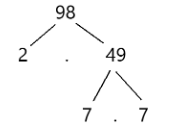
How do you write 98 as a product of prime factors $ ? $
Answer
558k+ views
Hint: Here in this question, we have to write 98 in terms of product of prime numbers. The prime number is defined as the number which is divisible by 1 and the number itself, 2, 3, 5, 7, … are the examples of prime numbers to write 98 in the terms of factors of prime numbers we use the division method.
Complete step-by-step answer:
Prime numbers are the positive integers having only two factors, 1 and the number itself. Any number which does not follow this is termed as composite numbers, which means that they can be factored into other positive integers. for example, factors of 12 are 1, 2, 3, 4, 6 and 12 which are 6 factors in total. But factors of 11 are only 1 and 11, totally two factors Hence, 11 is a prime number but 12 is not, instead is a composite number. But always remember that 1 is neither prime nor composite number.
Examples: - 2, 3, 5, 7, 11, 13, 17, 19, 23, 29, …
Now we write the given number 98 as a product of prime factors
Number 98 ends with an even digit, so we can tell that it is divisible by prime factor 2 .
$ \Rightarrow \dfrac{{98}}{2} = 49 $
Again, we have to try to divide for each possible prime factor in turn:
49 ends with an odd digit, so its not divisible by 2.
The sum of its digits 49 is 4+9=13, which is not divisible by 3, so 49 is not divisible by prime factor 3.
49 does not ends with 5 or 0, so its not divisible by prime factor 5.
49 is divisible by 7, then
$ \dfrac{{49}}{7} = 7 $
7 is also one of prime factor, then we write given number 98 as
$ \Rightarrow \,\,98 = 2\times 7\times 7 $
2 and 7 are prime factors
The factor tree of 98 can be written as

So, the correct answer is “ $ \,98 = 2\times 7\times 7 $ ”.
Note: We have different types of numbers namely natural numbers, whole numbers, integers etc., prime number is one of the forms of natural numbers. The prime number is defined as the number which is divisible by 1 and the number itself. The number which is not prime then it is composite. So by using the prime numbers we write the given number as a product of prime numbers.
Complete step-by-step answer:
Prime numbers are the positive integers having only two factors, 1 and the number itself. Any number which does not follow this is termed as composite numbers, which means that they can be factored into other positive integers. for example, factors of 12 are 1, 2, 3, 4, 6 and 12 which are 6 factors in total. But factors of 11 are only 1 and 11, totally two factors Hence, 11 is a prime number but 12 is not, instead is a composite number. But always remember that 1 is neither prime nor composite number.
Examples: - 2, 3, 5, 7, 11, 13, 17, 19, 23, 29, …
Now we write the given number 98 as a product of prime factors
Number 98 ends with an even digit, so we can tell that it is divisible by prime factor 2 .
$ \Rightarrow \dfrac{{98}}{2} = 49 $
Again, we have to try to divide for each possible prime factor in turn:
49 ends with an odd digit, so its not divisible by 2.
The sum of its digits 49 is 4+9=13, which is not divisible by 3, so 49 is not divisible by prime factor 3.
49 does not ends with 5 or 0, so its not divisible by prime factor 5.
49 is divisible by 7, then
$ \dfrac{{49}}{7} = 7 $
7 is also one of prime factor, then we write given number 98 as
$ \Rightarrow \,\,98 = 2\times 7\times 7 $
2 and 7 are prime factors
The factor tree of 98 can be written as

So, the correct answer is “ $ \,98 = 2\times 7\times 7 $ ”.
Note: We have different types of numbers namely natural numbers, whole numbers, integers etc., prime number is one of the forms of natural numbers. The prime number is defined as the number which is divisible by 1 and the number itself. The number which is not prime then it is composite. So by using the prime numbers we write the given number as a product of prime numbers.
Recently Updated Pages
Master Class 8 Social Science: Engaging Questions & Answers for Success

Master Class 8 English: Engaging Questions & Answers for Success

Class 8 Question and Answer - Your Ultimate Solutions Guide

Master Class 8 Maths: Engaging Questions & Answers for Success

Master Class 8 Science: Engaging Questions & Answers for Success

Master Class 9 General Knowledge: Engaging Questions & Answers for Success

Trending doubts
What is BLO What is the full form of BLO class 8 social science CBSE

Citizens of India can vote at the age of A 18 years class 8 social science CBSE

Full form of STD, ISD and PCO

Advantages and disadvantages of science

Right to vote is a AFundamental Right BFundamental class 8 social science CBSE

What are the 12 elements of nature class 8 chemistry CBSE





